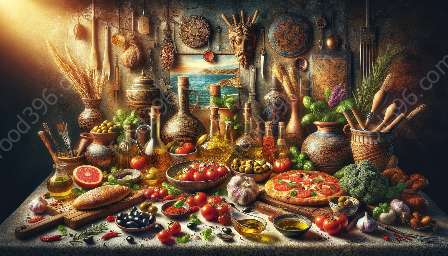The Mediterranean trade routes played a crucial role in shaping the history of global trade, cultural exchange, and culinary traditions. The exchange of goods, ideas, and culinary practices along these routes significantly influenced the development of Mediterranean cuisine as well as the broader history of global cuisine.
The Mediterranean Trade Routes
The Mediterranean Sea has served as a hub of trade and cultural exchange for thousands of years. The network of maritime routes connected various civilizations, including the ancient Phoenicians, Greeks, Romans, and Egyptians, facilitating the exchange of commodities such as spices, grains, olive oil, wine, and other agricultural products.
The Silk Road, connecting the Mediterranean with Asia, further contributed to the exchange of goods, including spices, tea, and silk. This interconnected web of trade routes had a profound impact on the culinary traditions and flavors of the Mediterranean region.
Culinary Exchange Along the Mediterranean
The exchange of goods along the Mediterranean trade routes also led to the sharing of culinary knowledge and practices. Different cultures and civilizations contributed to the rich diversity of Mediterranean cuisine through the exchange of ingredients, cooking techniques, and recipes.
For example, the introduction of new spices and herbs, such as cinnamon, cloves, and saffron, from the East greatly influenced the flavors of Mediterranean dishes. Additionally, the cultivation of citrus fruits in Mediterranean regions, initially brought from Asia, transformed the culinary landscape, giving rise to dishes featuring lemon, orange, and other citrus flavors.
Impact on Mediterranean Cuisine
The culinary exchange along the Mediterranean trade routes profoundly impacted the evolution of Mediterranean cuisine. The blending of flavors, cooking methods, and ingredients from different regions fostered the creation of distinct regional cuisines, such as Italian, Greek, Spanish, and Turkish cuisine.
The adoption of new agricultural products, including tomatoes, eggplants, and zucchini, from the Americas during the Columbian Exchange further enriched Mediterranean cuisine and laid the foundation for iconic dishes like ratatouille and caponata.
Mediterranean Cuisine in Global History
Mediterranean cuisine has also played a significant role in the broader history of global cuisine. The influence of Mediterranean ingredients and cooking techniques has transcended geographical boundaries and has been integrated into various culinary traditions around the world.
For instance, the widespread use of olive oil, a staple of Mediterranean cooking, has not only become a hallmark of Mediterranean cuisine but has also been embraced in international cuisines, from Middle Eastern to Latin American dishes.
Evolution of Mediterranean Cuisine
Over time, Mediterranean cuisine has continued to evolve, blending traditional recipes with contemporary influences. The fusion of culinary traditions and the ongoing exchange of flavors and ideas have led to the emergence of modern interpretations of Mediterranean dishes, catering to diverse palates and dietary preferences.
From the ancient practice of bread-making to the art of preparing mezze platters and seafood-based specialties, the evolution of Mediterranean cuisine reflects the enduring legacy of the region's rich culinary history and its enduring impact on global gastronomy.

